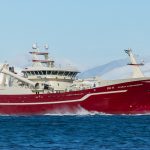A vision of how Scotland can ‘reap the benefits’ of taking control of its own fisheries management was set out in detail today.
Fisheries Secretary Richard Lochhead told a major international conference in Edinburgh that the time has come for the EU to ‘repair the damage’ caused by the ‘broken’ Common Fisheries Policy (CFP).
He said that discards – the practice of throwing dead fish back into the sea – is widely regarded by skippers, environmental experts and scientists as one of the CFP’s biggest flaws.
He also said that, at present, European regulations mean that fishermen have little choice but to throw away much of the fish they catch.
Currently well over a third of all cod caught in the North Sea and West of Scotland is thrown away. North Sea whitefish discards are worth around £60 million a year – a problem which is greatly compounded when the actions of other non-Scottish fleets are taken into account.
Addressing the Inter-RAC Conference today, Mr Lochhead said:
“The Commission has admitted that CFP is broken and in need of a major makeover.
Its remote micromanagement and insensitive regulation make it arguably the most ill thought out European policy currently affecting Scotland.
“Scotland is now leading the debate on how its replacement will best serve the interests of fishermen and our environment. We are currently in the process of drafting a detailed response to the CFP Green Paper.
“We already know that Scottish fishermen lead Europe in taking ground breaking conservation measures and they can be trusted to deliver if awarded additional responsibilities. Just imagine what could be achieved if we were masters of our own destiny.
“It is important that greater powers are returned to Scotland. Our guiding principle throughout next year’s CFP negotiations is simple: decision making must be returned to Scotland where it belongs. But we can’t wait for 2013 for radical changes – we need changes now – before it’s too late for our fishermen and fish stocks.
“On discards, in return for taking less fish from the sea in the first place, our fishermen should be allowed to land more of what they do catch rather than be forced to dump it over the side of the boat. For reducing overall fishing effort, our fishermen should be rewarded by being allowed to land and sell much of what is currently thrown overboard. We need to stop simply regulating what is landed ashore and instead concentrate on what is actually removed from the sea in the first place. That means moving to catch quotas away from the current failed system.
“Today I have taken that message direct to the European fisheries officials. It is an utter disgrace that our fishermen are being forced to dump high quality and marketable fish back into the sea – hundreds of millions of pounds wasted and unnecessary pressure on our stocks due to the crazy rules of the CFP.
“Deciding how to best manage our seas once we regain control of fisheries policy must be done in partnership with the industry which is why our consultation on the future of the CFP is so important. We are in the middle of a storm caused by a broken CFP and low quayside prices, but by working together we can navigate our way through it.”
Almost two-thirds of Scotland’s top fish stocks for which the status is known are being fished sustainably. Over half of all Scottish fisheries by value are accredited by the Marine Stewardship Council.
In Scottish waters, different species, such as cod and whiting, swim together. Yet Europe issues separate quotas for each individual species. This means that when fishermen haul in several species in the one net the law makes them discard those fish for which they have no quotas even though the fish are already dead. Fishermen do deploy selective nets and they help greatly. But in a mixed fishery like Scotland’s, it remains very difficult to catch one species at a time.
During 2007, whitefish worth an estimated £60 million was discarded in the North Sea. Since then Scotland has developed a number of innovative conservation measures such as selective gear and closure schemes to reduce catching fish without quota that is then discarded. These measures are reducing wastage, but Scottish Ministers believe that Europe must change its rules now to prevent the waste of hundreds of millions of pounds worth of our fishing resource.
The Inter Regional Advisory Council Conference is being co-hosted by the Scottish Government on November 3-4 at the Merchant’s Hall, Edinburgh. It is entitled ‘Decision-Making in the Reform of the Common Fisheries Policy’ and is the most high-profile plank of the Scottish Government’s CFP reform consultation process. It features a number of well- known international speakers and delegates, including President of the Committee on Fisheries of the European Parliament Carmen Fraga Estevez and David Symes, a leading commentator on fisheries policies and member of the Inquiry into Future Fisheries Management, an independent panel established by the Scottish Government to consider alternative fisheries management regimes.








